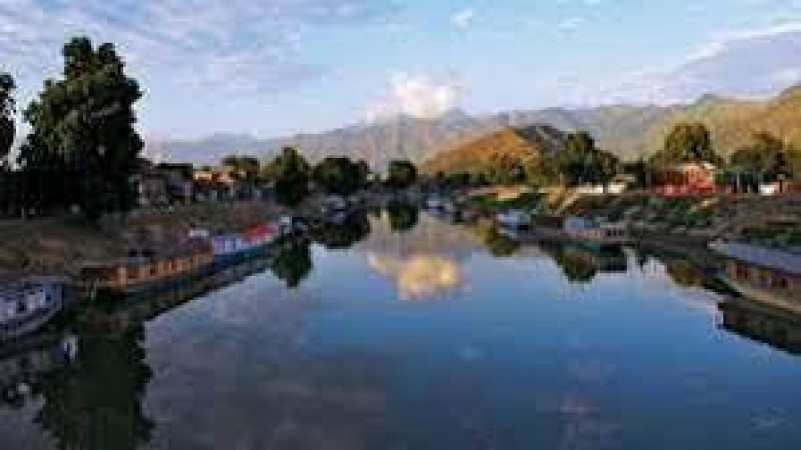
Jhelum River
Duration
1 to 2 Days
1 to 2 Days
Best time to visit
Apr-Jun
Apr-Jun
Theme
Waterfront
Waterfront
Jhelum River Travel Guide
Jhelum River, located in northern India and eastern Pakistan, is a significant river with historical, geographical, and cultural importance. It flows through the picturesque Himalayan region, offering stunning views and fertile lands along its banks. The river has played a vital role in the region's history, serving as a transportation route and a source of irrigation for centuries. Jhelum River is famous for its role in the famous Battle of the Hydaspes between Alexander the Great and King Porus in 326 BC.Top Attractions in Jhelum River
- Mangla Dam
- Rohtas Fort
- Tilla Jogian
- Peer Chinasi
Jhelum River is Famous for
Natural beauty and historical significance.Top Attractions in Jhelum River
- Explore the majestic Mangla Dam
- Visit the ancient Rohtas Fort
- Hike to the mystical Tilla Jogian hilltop
- Experience spirituality at Peer Chinasi shrine
What's Great about Travelling to Jhelum River?
- Perfect destination for history buffs
- Scenic beauty for nature lovers
- Rich cultural experiences
What's Not So Great about Travelling to Jhelum River?
- Limited tourist infrastructure
- Seasonal weather challenges
- Language barriers for non-native speakers
Travel Tips for Jhelum River
- Check visa requirements before traveling
- Use reliable transportation options
- Respect local customs and traditions
Important Jhelum River trip information
- Ideal Duration: 3-4 days
- Best Time to Visit: October to March
- Nearby Airports and Railway Stations: Nearest airport is in Islamabad, Pakistan, and nearest railway station is in Jhelum city.
FAQ's on Jhelum River
Q1: What is the best time to visit Jhelum River?
The best time to visit Jhelum River is during the spring (March to May) and autumn (September to November) when the weather is pleasant for outdoor activities like boating and sightseeing. Summers can be hot, while winters can be chilly, so plan your visit accordingly based on your preferences and activities. Consider visiting during festivals or events to experience the local culture.
Q2: Do I need a visa to travel to Jhelum River?
Most travelers do not need a visa specifically for visiting Jhelum River as it flows through Pakistan and India. However, if you plan to visit specific regions or cross borders, check the visa requirements of the respective countries. Make sure your travel documents are in order to avoid any issues during your trip.
Q3: What are the must-visit attractions in Jhelum River?
The must-visit attractions along Jhelum River include the Rohtas Fort in Pakistan, the ancient Martand Sun Temple in India, and the scenic viewpoints along the riverbanks. Explore the historical sites, take a boat ride on the river, and enjoy the natural beauty of the surrounding areas for a memorable experience.
Q4: Is Jhelum River a safe place to travel?
Jhelum River is generally safe for travelers, but it's essential to exercise caution, especially near water bodies. Be mindful of your surroundings, avoid isolated areas at night, and follow any local guidelines for safety. Stay informed about any travel advisories or updates before your trip.
Q5: What is the local currency in Jhelum River and can I use credit cards?
The local currency in Pakistan is the Pakistani Rupee (PKR), while in India, it is the Indian Rupee (INR). ATMs are available in major towns for cash withdrawals, and credit cards are accepted in some establishments. It's advisable to carry some cash for transactions in smaller shops or markets.
Q6: What is the local cuisine like in Jhelum River?
The local cuisine along Jhelum River offers a mix of Pakistani and Indian dishes, including biryani, kebabs, samosas, and various sweets. Try the street food for a taste of authentic flavors, but be cautious with spicy dishes if you have a sensitive stomach. Vegetarian options are also widely available.
Q7: What transportation options are available in Jhelum River?
Transportation options along Jhelum River include buses, taxis, and auto-rickshaws for local travel. Boats are a popular way to explore the river and its surroundings. Renting a car can provide more flexibility for visiting different attractions along the riverbanks.
Q8: Are there any cultural norms or etiquette I should be aware of when visiting Jhelum River?
When visiting Jhelum River, respect local customs by dressing modestly, especially when visiting religious sites. Greet people with a smile and learn a few basic phrases in Urdu or Hindi as a sign of respect. Avoid public displays of affection and ask for permission before taking photographs of locals.
Q9: I am a travel agent. How can I buy travel leads of Jhelum River?
Register yourself as a travel agent at agents.tripclap.com and then you can buy travel leads to Jhelum River once your account is approved. For more details contact our support team at +91-8069186564 or support@tripclap.com
